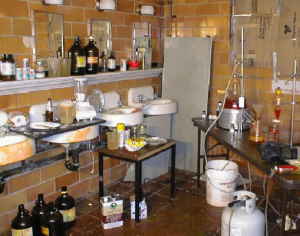Posted by Teresa on November 30, 2011 under Landlord Tips | 
 The biggest multi-family housing owners in the U.S. have been using a secret weapon to maximize rental revenue and minimize vacancy. For about the past ten years, the landlords of a collective one million rental apartments have been renewing leases and setting rents using powerful technology to manage revenue. The software applications are similar to those used by airlines and hotels to set ticket prices and room rates.
The biggest multi-family housing owners in the U.S. have been using a secret weapon to maximize rental revenue and minimize vacancy. For about the past ten years, the landlords of a collective one million rental apartments have been renewing leases and setting rents using powerful technology to manage revenue. The software applications are similar to those used by airlines and hotels to set ticket prices and room rates.
The software instantly analyzes competitor rents, the current rental market, seasonal trends, property history and other variables to calculate the highest feasible rent at a given time. The landlords can then offer the tenant or prospective tenant that rent. It may be a lower rate for a less-desirable unit, so the tenant can save money. It may mean an increase in rent for a renewing tenant, based on the going rate for their unit.
Some suggestions made by the software are surprising. One landlord began offering one-month leases when an analysis showed a demand for it. Leasing a $1,000 unit for a single month at $3,000 turned out to be good idea—that they would not have previously considered.
Other rental property owners say the software helps them become more conscious of their competitors and why they were losing leases. The number of variables considered is much more extensive than a human would think to include.
While it’s a given that the biggest landlords would utilize revenue management software, it appears to be gaining popularity with smaller rental property owners as well. Users say the software pays for itself within months, with 3 – 7% revenue increases from the start.
Posted by Teresa on November 18, 2011 under Housing Trends, Rental Market | 
 Trulia is a real estate website where home buyers, renters, and sellers can track sales and rental activity in any city or neighborhood. The website recently launched a new report that reveals where renters and homebuyers live now, compared to where they want to live in the future.
Trulia is a real estate website where home buyers, renters, and sellers can track sales and rental activity in any city or neighborhood. The website recently launched a new report that reveals where renters and homebuyers live now, compared to where they want to live in the future.
The report tracked searches on the site between July 1 and September 30, 2011. The results may reveal where demand could be increasing ahead of actual sales and lease information. Trulia’s Chief Economist said that they believe the low prices in areas like Florida, Nevada and California will draw more prospective movers – who will be attracted to buying, rather than renting homes, as rental markets continue to tighten.
The company created an index for each metro area, based on the numbers of property views by people who live elsewhere. It also took into account the number of out-of-area property searches conducted by locals in each metro region.
The Top Ten High Demand Metro Areas For Homebuyers
1. Sarasota, FL: Foreclosure jumped 57% last quarter; home prices have fallen 51.4% since the peak and are expected to decline another 6.5% through Q2 2012. For every person in Sarasota looking for a home elsewhere, 6.03 people from out of the area are looking at Sarasota real estate.
2. Riverside, CA: High unemployment and poor economic conditions led to 55.4% drop in home prices from the peak and they are expected to decline another 14.8% through Q2 2012. For every person in Riverside looking for a home elsewhere, 4.36 people from out of the area are looking at Riverside real estate.
3. Charleston, SC: Real estate prices are down 23.3% since the peak and are expected to decline another 1.6% through Q2 2012. For every person in Charleston looking for a home elsewhere, 2.25 people from out of the area are looking at Charleston real estate. Retirement destination.
4. Fort Lauderdale, FL: Median home price went from $400K to under $200K in five years. Real estate prices are down 48.4% since the peak and are expected to decline another 9.2% through Q2 2012. For every person in Fort Lauderdale looking for a home elsewhere, 2.15 people from out of the area are looking at Fort Lauderdale real estate. Lots of retirees.
5. Cape Coral, FL: The market is bad here, but bargains exist. Real estate prices are down 59.3% since the peak and are expected to decline another 12.2% through Q2 2012. For every person in Cape Coral looking for a home elsewhere, 2.09 people from out of the area are looking at Cape Coral real estate.
6. West Palm Beach – Boca Raton, FL: One in four home sales in past year was a foreclosure. Real estate prices are down 50.2% since the peak and are expected to decline another 9.6% through Q2 2012. For every person in West Palm Beach looking for a home elsewhere, 1.99 people from out of the area are looking at West Palm Beach real estate.
7. Fort Worth – Arlington, TX: Home prices going up. Real estate prices are down just 5.9% since the peak and are expected to increase 2.7% through Q2 2012. For every person in Fort Worth looking for a home elsewhere, 1.97 people from out of the area are looking at Fort Worth real estate. Mostly from Dallas.
8. Oxnard, CA: Mecca for retirees. Real estate prices are down 40% since the peak and are expected to decline an additional 6% through Q2 2012. For every person in Oxnard looking for a home elsewhere, 1.92 people from out of the area are looking at Oxnard real estate.
9. Las Vegas: Two out of three homes underwater. Real estate prices are down 60% since the peak and are expected to decline an additional 11.4% through Q2 2012. For every person in Vegas looking for a home elsewhere, 1.88 people from out of the area are looking at Vegas real estate.
10. Orlando, FL: Hit hard by the housing crisis. Real estate prices are down 53.4% since the peak and are expected to decline an additional 11.4% through Q2 2012. For every person in Orlando looking for a home elsewhere, 1.87 people from out of the area are looking at Orlando real estate.
Posted by Teresa on November 16, 2011 under Landlord Tips, Tenant Screening & Background Checks | 
 If methamphetamine-manufacturing tenants in Cuyahoga Falls, Ohio get busted, they are expected to pay the costs of cleaning up their labs and disposing of the hazardous waste. If they cannot pay for cleanup after their labs are discovered, their landlords are now responsible, thanks to a new amendment to an existing law.
If methamphetamine-manufacturing tenants in Cuyahoga Falls, Ohio get busted, they are expected to pay the costs of cleaning up their labs and disposing of the hazardous waste. If they cannot pay for cleanup after their labs are discovered, their landlords are now responsible, thanks to a new amendment to an existing law.
Until recently, state and federal funds paid for dismantling and removing labs, but that money has come to an end. The local police chief estimated cleanup costs of $1,000 to $5,000 for each meth lab. From removing traces of chemical residue, to dismantling and moving meth-related paraphernalia, landlords are on the hook for everything.
While recognizing that the majority of landlords don’t knowingly lease to drug manufacturers or dealers, the city council that passed the new law stated that it’s simply a cost of doing business.
Some landlords have attended training sessions about meth labs, including lessons on how to identify a lab and what to do if they find one. Meth labs are quick to set up, and the process of manufacturing meth uses easily acquired chemicals.
The real problem for landlords with meth lab cleanup costs is that insurance generally will not reimburse the expense. Not dealing with the problem is not an option. The chemicals used to make meth are extremely dangerous, and even traces of residue pose numerous health hazards, including liver, kidney and neurological damage, and increased risk of cancer.
What Is Involved in Cleaning Up a Meth Lab?
- The entire rental unit must be cleaned
- All traces of chemicals must be removed.
- Walls and ceilings painted
- Carpeting removed,
- All air filters replaced
- Ventilation systems cleaned
- Sinks and plumbing should be replaced
As the landlords of Cuyahoga Falls are discovering, meth labs are not a big-city problem. They are everywhere. The best way to avoid renting to drug manufacturers is to conduct thorough background checks and tenant screening on every applicant. If there is a history of drug convictions or other criminal records, you have the right to turn down the applicant.
Posted by Teresa on November 11, 2011 under Screening and Background Checks, Tenant Credit Checks, Tenant Screening & Background Checks | 
 Smart landlords always run tenant credit checks and prescreen tenants. They talk to applicants’ former landlords and check for criminal activity. But when the economy is so tough, many landlords find that screening tenants and making decisions on signing leases is based partly on data and partly on circumstance.
Smart landlords always run tenant credit checks and prescreen tenants. They talk to applicants’ former landlords and check for criminal activity. But when the economy is so tough, many landlords find that screening tenants and making decisions on signing leases is based partly on data and partly on circumstance.
For example, Wendy has been a landlord for many years, and has “seen it all.” She says that tenant credit scores are as volatile now as she can remember. “Some people with six-figure incomes have been forced to short sell their homes, and have lower credit scores as a result,” she said recently. “I’ve had to look more closely at their credit card and car payment history, and not just their credit score.” For Wendy, renting to people who recently owned and lost a home is less risky than renting to those who are continually late with rent payments or have history of evictions.
Mike, on the other hand, looks at credit scores and collection reports closely; he considers student loans collection activity to be a deal-breaker, but thinks medically-related collections reports are acceptable. “People can’t help what happens to their health,” he said. “Medical costs are outrageous and so many people don’t have insurance. I try to work with people who have had medical concerns.”
For most landlords we know, any eviction or rent collections activity on a prospective tenant’s credit report is not okay—even in these tough times. Bob is a fairly new and cautious landlord, who has been seeing more rent issues on credit reports. He always checks work references and tries to talk to as many landlords as he can. “Landlords usually tell me the real deal on their tenants. At first, I thought they’d give only good references, just to be done with a poor tenant, but I’m finding that they don’t want me to inherit their problems.”
Bob shared that he also talks to tenant applicants about any issues he finds on their credit reports. “I ask them why they didn’t pay their student loans, or what happened with the late car payments. Some will make excuses. Some will blame others. And a few own their credit problems and explain how they’re making them right.”
While credit scores are an important indicator of whether or not a tenant will qualify for a lease, many landlords indicate say that it’s not the only factor they consider. “A good rental and work history means more to me than a number,” says Brian. “I’m careful, but I prescreen and talk to work and landlord references before I make my decisions.”
Posted by Teresa on November 8, 2011 under Landlord Tips | 
 These days, tenants have more ways to complain, more publicly, than ever before. Instead of calling you or your property manager, dropping by your office to talk, or sending an actual letter through the U.S. Postal Service, tenants with issues are more likely to tell anyone who will listen through Facebook or Twitter.
These days, tenants have more ways to complain, more publicly, than ever before. Instead of calling you or your property manager, dropping by your office to talk, or sending an actual letter through the U.S. Postal Service, tenants with issues are more likely to tell anyone who will listen through Facebook or Twitter.
On the surface, this might not make sense, since as the landlord, you may never even see their complaint – unless you are “friends” with your tenants on Facebook.
So why do tenants complain on social media networks if landlords have little chance of hearing them? Some do it for attention; others have hopes of getting some results.
In some cities, groups of disgruntled tenants are banding together to create mini bad-publicity campaigns against their rental property owners. In other cases, a single tenant may send out a tweet or post to see if anyone else has a similar complaint.
Their motives are the same: they seek strength in numbers in hopes of getting attention or coming to a resolution. Before social media, there was no quick way for people to find each other and create a mini-movement. Now, it only takes a minute of their time and 140 characters to find dozens of others with similar problems.
How can a landlord handle a negative Facebook or Twitter campaign? The first rule of social networking is to respond, so if you do come across a tenant complaint on Facebook or Twitter, be proactive. Create an action plan, starting with a calm and neutral response. Acknowledge that you hear the complaint. You don’t necessarily need to admit to fault or take responsibility, but do let the tenant know they are being heard.
Next, ask the complainer to “take it offline,” with a private conversation or email exchange. Follow up by publicly thanking your tenant for their business and share how you resolved the issue. Remember, your tenants are your customers and deserve your respect and quick action.
A social media backlash by your tenants may be uncomfortable, but handling it badly will only make it worse. So be nice, and remember that everything you write can and will be held against you! Most important, try hard to be the better person. You’ll resolve the situation much faster by taking the high road – and you may even create more “fans.”
Posted by Teresa on November 4, 2011 under Landlord Tips | 
 If you’re a landlord, it’s a good idea to try to save energy and heating fuel in your rental properties—especially since heating bills are predicted to hit record highs this winter. And even if your tenants pay their own heat bills, isn’t it in your best interest, as well as theirs, to save them money if you can? When things are tight, as in this continued tough economy, helping tenants save money can keep you rent payments coming in steadily.
If you’re a landlord, it’s a good idea to try to save energy and heating fuel in your rental properties—especially since heating bills are predicted to hit record highs this winter. And even if your tenants pay their own heat bills, isn’t it in your best interest, as well as theirs, to save them money if you can? When things are tight, as in this continued tough economy, helping tenants save money can keep you rent payments coming in steadily.
What are the best ways to save more on heating by saving energy?
- Tax credits: Federal tax credits of up to $500 for energy-efficient appliances, furnaces and insulation installation. The money comes right off your taxes, and helps pay for the initial investment. If gas water heaters are more than 12 years old, consider replacing them.
- Rebates: States and utility companies offer rebates on furnaces, energy-efficient appliances, and other fuel-saving investments. Furnaces over 15 years old can often be replaced with more efficient ENERGY STAR rated models.
- Adding insulation: Many older homes are insufficiently insulated. Check into adding new insulation on your rental properties. Consider increasing ceiling insulation too. It’s easy to wrap the hot water tank with jacket insulation—very effective, especially if it’s an older model.
- Lower the thermostat: 68 degrees during the day and 55 at night is comfortable for most people. Every degree lower in the 60 – 70 degree range saves up to 5% of heating cost.
- Replacing or cleaning furnace filters: Dirty filters increase energy use. Keep them clean by changing often. If you do the replacing yourself, you also have the chance to check on your property and tenants.
- Get out the caulk: seal leaks around windows, doors, and where pipes and electrical conduit enter your building. Check under bathroom and kitchen sinks, the basement and utility closets.
- Install storm windows: for single-pane windows, storms are super-efficient. Or replace old windows with double-panes.
- Encourage tenants to use cold water when washing clothes: it reduces energy use by 75%. And remind them to clean the lint trap on the dryer after every load.
Saving energy takes information, an investment and a commitment. But the rewards can be enormous—especially if everyone does their part. Landlords could qualify for rebates that pay for upgrades, so why not look into them?
 The biggest multi-family housing owners in the U.S. have been using a secret weapon to maximize rental revenue and minimize vacancy. For about the past ten years, the landlords of a collective one million rental apartments have been renewing leases and setting rents using powerful technology to manage revenue. The software applications are similar to those used by airlines and hotels to set ticket prices and room rates.
The biggest multi-family housing owners in the U.S. have been using a secret weapon to maximize rental revenue and minimize vacancy. For about the past ten years, the landlords of a collective one million rental apartments have been renewing leases and setting rents using powerful technology to manage revenue. The software applications are similar to those used by airlines and hotels to set ticket prices and room rates.




